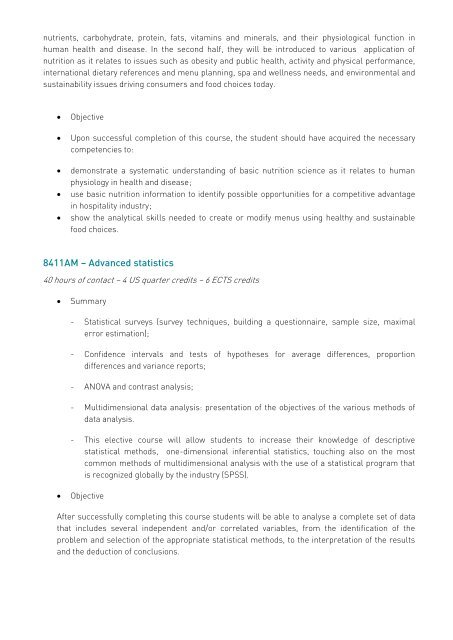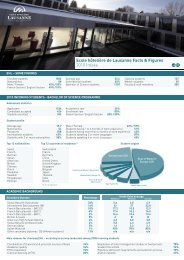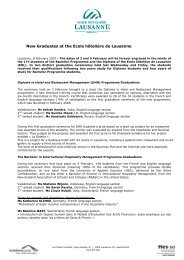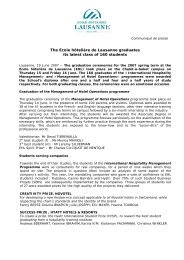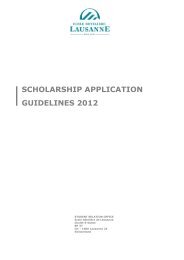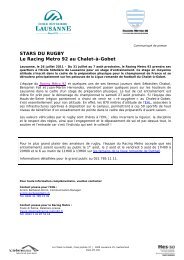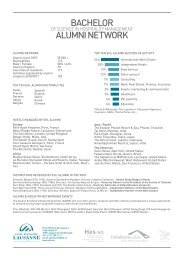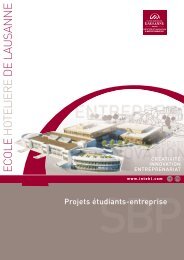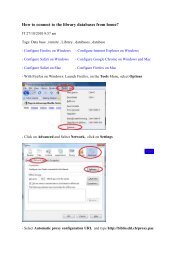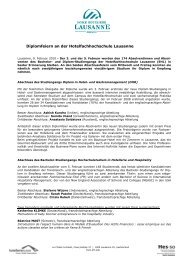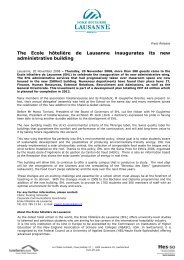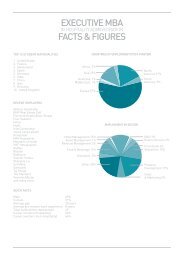EHL Course Catalogue 2011-2012 - Ecole Hôtelière de Lausanne
EHL Course Catalogue 2011-2012 - Ecole Hôtelière de Lausanne
EHL Course Catalogue 2011-2012 - Ecole Hôtelière de Lausanne
Create successful ePaper yourself
Turn your PDF publications into a flip-book with our unique Google optimized e-Paper software.
nutrients, carbohydrate, protein, fats, vitamins and minerals, and their physiological function in<br />
human health and disease. In the second half, they will be introduced to various application of<br />
nutrition as it relates to issues such as obesity and public health, activity and physical performance,<br />
international dietary references and menu planning, spa and wellness needs, and environmental and<br />
sustainability issues driving consumers and food choices today.<br />
� Objective<br />
� Upon successful completion of this course, the stu<strong>de</strong>nt should have acquired the necessary<br />
competencies to:<br />
� <strong>de</strong>monstrate a systematic un<strong>de</strong>rstanding of basic nutrition science as it relates to human<br />
physiology in health and disease;<br />
� use basic nutrition information to i<strong>de</strong>ntify possible opportunities for a competitive advantage<br />
in hospitality industry;<br />
� show the analytical skills nee<strong>de</strong>d to create or modify menus using healthy and sustainable<br />
food choices.<br />
8411AM – Advanced statistics<br />
40 hours of contact – 4 US quarter credits – 6 ECTS credits<br />
� Summary<br />
- Statistical surveys (survey techniques, building a questionnaire, sample size, maximal<br />
error estimation);<br />
- Confi<strong>de</strong>nce intervals and tests of hypotheses for average differences, proportion<br />
differences and variance reports;<br />
- ANOVA and contrast analysis;<br />
- Multidimensional data analysis: presentation of the objectives of the various methods of<br />
data analysis.<br />
- This elective course will allow stu<strong>de</strong>nts to increase their knowledge of <strong>de</strong>scriptive<br />
statistical methods, one-dimensional inferential statistics, touching also on the most<br />
common methods of multidimensional analysis with the use of a statistical program that<br />
is recognized globally by the industry (SPSS).<br />
� Objective<br />
After successfully completing this course stu<strong>de</strong>nts will be able to analyse a complete set of data<br />
that inclu<strong>de</strong>s several in<strong>de</strong>pen<strong>de</strong>nt and/or correlated variables, from the i<strong>de</strong>ntification of the<br />
problem and selection of the appropriate statistical methods, to the interpretation of the results<br />
and the <strong>de</strong>duction of conclusions.


